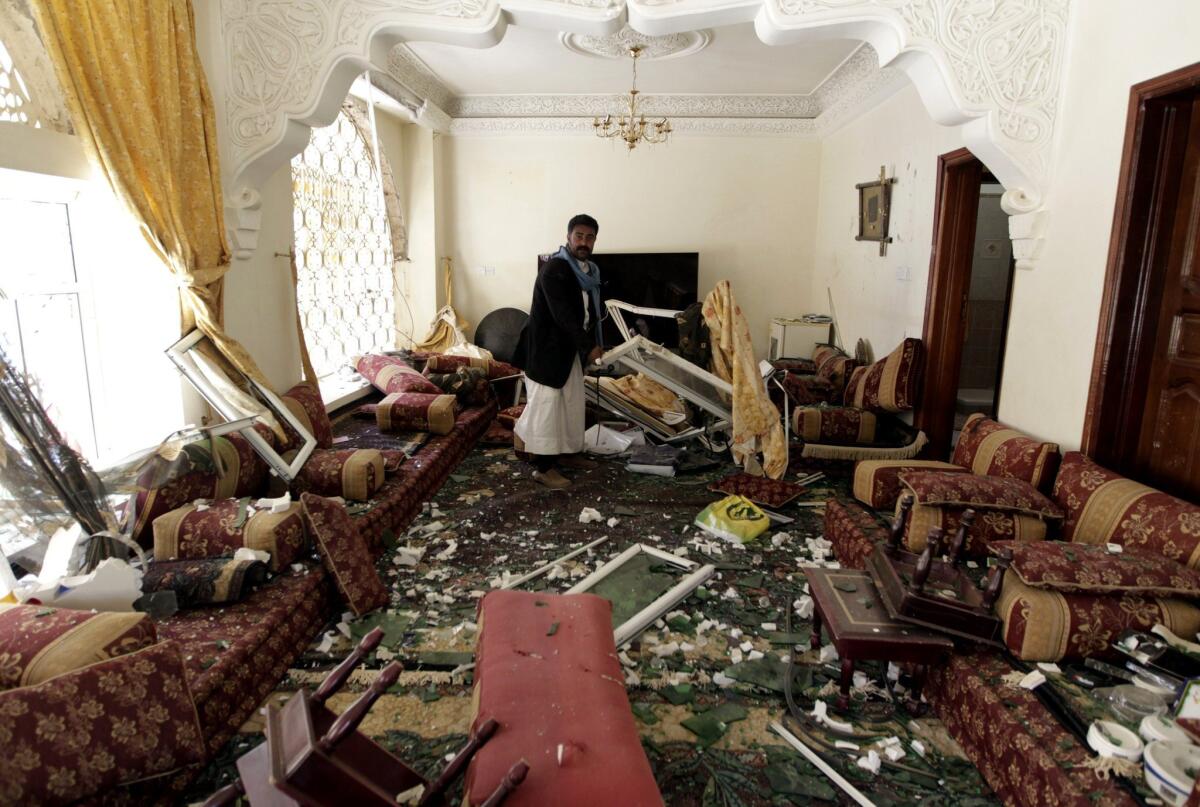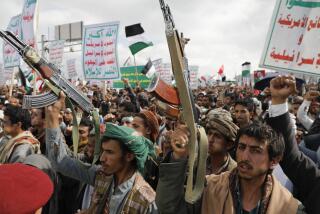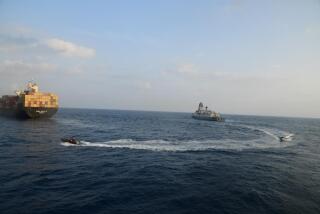U.S. trying to restrain Saudi Arabia on deadly Yemen airstrikes

Top Obama administration officials have failed for several days to persuade Saudi Arabia’s government to limit the scope of its airstrikes on cities and towns in Yemen, a campaign that authorities said killed nearly 50 people Monday in Sana, the capital.
The U.S. effort to restrain the Saudi attacks came as the Pentagon moved the aircraft carrier Theodore Roosevelt and a guided-missile destroyer into waters off Yemen. In all, nine U.S. warships are patrolling near strategic shipping lanes in the Gulf of Aden and the southern Arabian Sea.
Officials said the growing armada is meant, in part, to deter Iran from shipping weapons and other supplies to the Houthi rebels and their allies battling remnants of the central government for control of Yemen, the Arab world’s poorest nation.
White House Press Secretary Josh Earnest would not comment Monday on the movement of the carrier, but said the administration is increasingly alarmed about Iran arming the Houthis and the growing humanitarian crisis.
“We have seen evidence that the Iranians are supplying weapons and other forms of support to the Houthis in Yemen,” he said. “That support will only contribute to greater violence in that country.”
Saudi warplanes began bombing Yemen on March 26 in an effort to stop the swift advance of the Shiite Muslim rebels, to protect the kingdom’s southern border and to return President Abdu Rabu Mansour Hadi, who fled into exile last month, to power in Sana.
The Obama administration is supporting the Saudi-led air war with intelligence, air refueling operations, expedited weapons deliveries and other crucial support.
But senior U.S. officials, who were not enthusiastic about the Saudi war plan, are increasingly dismayed by heavy civilian casualties and now believe it highly unlikely that Hadi can be reinstated without a ground invasion. They also worry that the turmoil has allowed Yemen’s Al Qaeda affiliate to expand its territory.
The White House would like Saudi Arabia and its Sunni Arab allies to curtail the airstrikes and narrow the objective to focus on protecting the Saudi border, according to a senior administration official, who spoke on condition of anonymity in discussing internal deliberations.
Rep. Adam B. Schiff (D-Burbank), the top Democrat on the House Intelligence Committee, said the administration is trying to work with the Saudi government “to frame an achievable objective.”
“There is an effort to walk the Saudis through the process and point out that there is a limit to what you can accomplish through the air,” Schiff said in a telephone interview.
National Security Council spokesman Alistair Baskey said the White House is in “constant dialogue” with Saudi Arabia and other allies about how to “reach a power-sharing agreement that would allow Yemen” to form a new government.
“At the same time, the United States continues to provide support to the Saudi-led campaign, particularly as the Houthis and their supporters have not ceased their military actions,” Baskey said.
President Obama, who spoke to Saudi King Salman by phone Friday, met at the White House on Monday with Crown Prince Mohammed bin Zayed al Nahyan of the United Arab Emirates, which is part of the coalition conducting the airstrikes.
The United Nations last week reported more than 760 civilian deaths in the last month. An airstrike Monday in Sana killed nearly 50 more people, injured hundreds more and wrecked a large number of homes, officials said.
The airstrike apparently targeted a mountaintop missile depot but set off a series of secondary explosions that shattered windows miles away, wrecked dozens of storefronts and sent smoke billowing skyward. The acting health minister, Ghazi Ismael, appealed for blood donations for the injured and for safe passage for medical supplies, and the ministry said its official death toll of 46 would probably rise because many injuries were critical.
A spokesman for the Saudi-led coalition, Brig. Gen. Ahmed Asiri, blamed the explosions on the Houthis and their allies. “The size of the explosions … showed they have other ammunition and missiles stored there,” Asiri told reporters in Riyadh, the Saudi capital.
U.S. officials in Riyadh and Qatar are sharing intelligence from surveillance drones and spy satellites with officers from the Saudi-led coalition but are not approving individual targets, according to Pentagon officials.
“The air component is providing the Saudis intel on potential targets that include … civilian casualty mitigation procedures,” Lt. Col. Kristi Beckman, Air Force spokeswoman for U.S. Central Command, said Monday. “We aren’t approving targets by any nations conducting strikes in Yemen.”
Despite the buildup of U.S. warships off Yemen’s coastline, the U.S. Navy does not stop and board other ships under normal circumstances unless the other captain agrees. The Navy said it has not sought to board any Iranian ships since the air campaign began.
On April 1, sailors from the Sterett, a guided-missile destroyer, boarded and searched a Panamanian-flagged vessel, the Saisaban, in the Red Sea, the Pentagon said. The sailors found no contraband.
Christopher Harmer, a Middle East analyst at the Institute for the Study of War, a public policy group in Washington, said sending the carrier Roosevelt greatly expands the Pentagon’s ability to watch for illegal activities.
“The Navy is sending a message to Iran and the Houthis: ‘We might not be ready to start jumping your ships today, but we know what you’re up to,’” he said.
“But I’d be surprised if this has any effect at all,” he added. “The Iranians are used to the U.S. Navy being in their backyard.”
Times staff writer Laura King in Cairo and special correspondent Zaid al-Alayaa in Sana contributed to this report.
More to Read
Start your day right
Sign up for Essential California for news, features and recommendations from the L.A. Times and beyond in your inbox six days a week.
You may occasionally receive promotional content from the Los Angeles Times.








